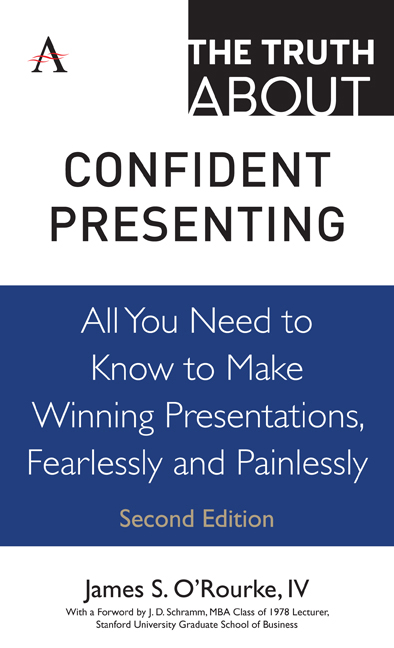 The Truth about Confident Presenting
The Truth about Confident Presenting Book contents
- Frontmatter
- Contents
- Foreword
- Introduction
- Part I Some Initial Truths
- Part II The Truth About Getting Ready to Speak
- Part III The Truth About What Makes People Listen
- Truth 13 Understand what makes people listen
- Truth 14 Your speaking style makes a difference
- Truth 15 Anticipate the questions your audience brings to your presentation
- Truth 16 Listening matters
- Truth 17 Being an active listener brings real benefits
- Truth 18 You can overcome the barriers to successful communication
- Part IV The Truth About Developing Support for Your Presentation
- Part V The Truth About Getting Up to Speak
- Part VI The Truth About Managing Anxiety
- Part VII The Truth About Nonverbal Communication
- Part VIII The Truth About Visual Aids
- Part IX The Truth About Handling an Audience
- Part X The Truth About What Makes a Presentation Work
- References
- Acknowledgments
- About the Author
Truth 18 - You can overcome the barriers to successful communication
from Part III - The Truth About What Makes People Listen
- Frontmatter
- Contents
- Foreword
- Introduction
- Part I Some Initial Truths
- Part II The Truth About Getting Ready to Speak
- Part III The Truth About What Makes People Listen
- Truth 13 Understand what makes people listen
- Truth 14 Your speaking style makes a difference
- Truth 15 Anticipate the questions your audience brings to your presentation
- Truth 16 Listening matters
- Truth 17 Being an active listener brings real benefits
- Truth 18 You can overcome the barriers to successful communication
- Part IV The Truth About Developing Support for Your Presentation
- Part V The Truth About Getting Up to Speak
- Part VI The Truth About Managing Anxiety
- Part VII The Truth About Nonverbal Communication
- Part VIII The Truth About Visual Aids
- Part IX The Truth About Handling an Audience
- Part X The Truth About What Makes a Presentation Work
- References
- Acknowledgments
- About the Author
Summary
Every presenter faces barriers to success as a speaking occasion arises. Some barriers are fairly mundane: am I available that evening? Can I reschedule another obligation? Will I be able to gather the information I need to answer their questions? Other barriers, though, are more serious and can present great difficulties for a speaker. Obstacles to success appear to fall broadly into five categories:
Stereotypes. Stereotyping is to ascribe to all members of a group or class those characteristics or behaviors observed in just one or a few. The word was coined by social scientist Walter Lippmann in 1921 when he wrote about why people so readily imagine how other people are, or why they behave as they do, even in the face of ready evidence to the contrary. The fact is people are comfortable with stereotypes. They help to explain the world around you, don't require much effort to construct and give you categories into which you can insert new experiences, new people and new ideas. Treating each person as unique or different is much more difficult and requires a great deal more reasoning and work on your part. Stereotypes may be useful as a starting point from which to understand groups and their members, but they can be very damaging when you fail to acknowledge differences within those groups or when you fail to admit that not all people act or think in the same ways.
Prejudice. This is a word derived from Latin, meaning “to judge before knowing.” You do it all the time. In fact, it's not necessarily bad. You have little prejudices that serve you well: the food you eat, the stores you shop in, your taste in clothing. Often, when you speak, you are forced to judge before you have all the facts. You simply don't have the time or the resources to gather more information. You must act now.
As we speak to others, though, it's best to acknowledge that you are working with incomplete data. Admit that you don't know as much as you might like, or, perhaps, that you simply didn't have time to gather information that might have been easily available to you. You don't want others making judgments about you too quickly.
- Type
- Chapter
- Information
- The Truth about Confident PresentingAll You Need To Know To Make Winning Presentations, Fearlessly And Painlessly, pp. 69 - 72Publisher: Anthem PressPrint publication year: 2019


